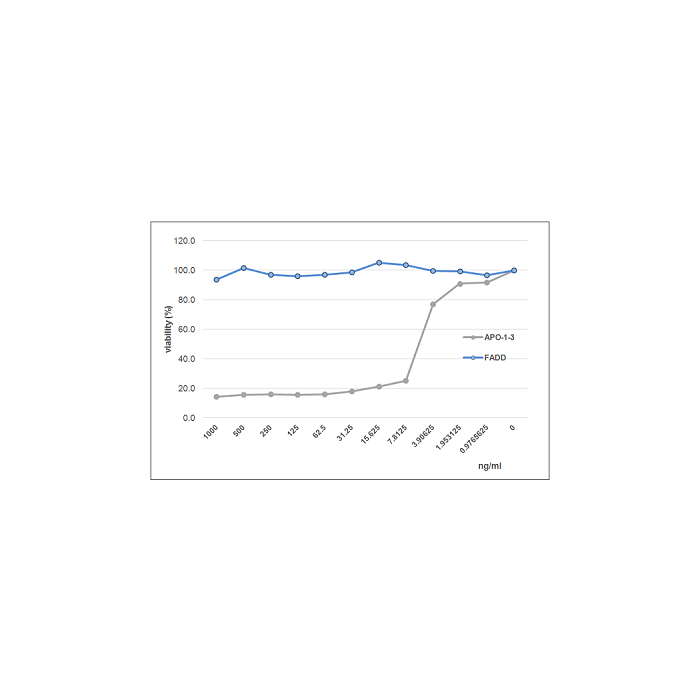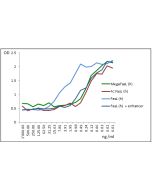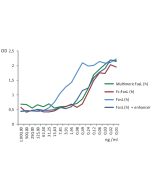Cookie Policy: This site uses cookies to improve your experience. You can find out more about our use of cookies in our Privacy Policy. By continuing to browse this site you agree to our use of cookies.
AdipoGen Life Sciences
anti-Fas (human), mAb (APO-1-3) (preservative free)

Method: The human B lymphoblast cell line SKW6.4 is treated for 24 hours with different concentrations of the antibody Fas (human), mAb (APO-1-3) (Prod. No. AG-20B-0062PF) or with a control antibody (FADD (human), mAb (1C4) (Prod. No. AG-20B-0080). Cell death is quantified using the “CellTiter 96® AQueous One Solution Cell Proliferation Assay” from Promega.
| Product Details | |
|---|---|
| Synonyms | CD95; APO-1; TNFRSF6; Tumor Necrosis Factor Receptor Superfamily Member 6; Apoptosis-mediating Surface Antigen FAS |
| Product Type | Monoclonal Antibody |
| Properties | |
| Clone | APO-1-3 |
| Isotype | Mouse IgG3 |
| Source/Host | Purified from concentrated hybridoma tissue culture supernatant. |
| Immunogen/Antigen | Recombinant human Fas. |
| Label/Conjugates | Preservative Free |
| Application |
Flow Cytometry: 1-2µg/ml |
| Crossreactivity | Human |
| Specificity |
Recognizes human Fas. |
| Purity | ≥95% (SDS-PAGE) |
| Concentration | 1 mg/ml. |
| Formulation | Liquid. In PBS. |
| Isotype Negative Control | |
| Other Product Data |
Uniprot: Fas (human) |
| Shipping and Handling | |
| Shipping | BLUE ICE |
| Short Term Storage | +4°C |
| Long Term Storage | -20°C |
| Handling Advice | Avoid freeze/thaw cycles. |
| Use/Stability | Stable for at least 1 year after receipt when stored at -20°C. |
| Documents | |
| MSDS |
 Download PDF Download PDF |
| Product Specification Sheet | |
| Datasheet |
 Download PDF Download PDF |
Fas (CD95) is a member of the death receptor (DR) family, a subfamily of the tumor necrosis factor receptor superfamily. The formation of the Fas death-inducing signaling complex (DISC) is the initial step of Fas signaling. Activation of procaspase-8 at the DISC leads to the induction of DR-mediated apoptosis. Stimulation of Fas has been also reported to trigger non-apoptotic pathways. It has been shown that membrane-bound FasL is essential for the cytotoxic activity, whereas soluble FasL appears to promote autoimmunity and tumorigenesis via induction of non-apoptotic pathways, in particular NF-κB.
- Monoclonal antibody-mediated tumor regression by induction of apoptosis: B.C. Trauth, et al.; Science 245, 301 (1989)
- Monoclonal-antibody-mediated apoptosis in adult T-cell leukaemia: K.M. Debatin, et al.; Lancet 335, 497 (1990)
- Induction of apoptosis by monoclonal antibody anti-APO-1 class switch variants is dependent on cross-linking of APO-1 cell surface antigens: J. Dhein, et al.; J. Immunol. 149, 3166 (1992)
- APO-1-induced apoptosis of leukemia cells from patients with adult T-cell leukemia: K.M. Debatin, et al.; Blood 81, 2972 (1993)
- The apoptosis-1/Fas protein in human systemic lupus erythematosus: E. Mysler, et al.; J. Clin. Invest. 93, 1029 (1994)
- Inhibition of apoptosis in T cells expressing human T cell leukemia virus type I Tax: K.F. Copeland, et al.; AIDS Res. Hum. Retroviruses 10, 1259 (1994)
- Activation induces sensitivity toward APO-1 (CD95)-mediated apoptosis in human B cells: P.T. Daniel & P.H. Krammer; J. Immunol. 152, 5624 (1994)
- APO-1 (CD95) mediated apoptosis in human T-ALL engrafted in SCID mice: K.M. Lücking-Famira, et al.; Leukemia 8, 1825 (1994)
- Apoptotic cell death induced by a mouse-human anti-APO-1 chimeric antibody leads to tumor regression: L.R. Coney, et al.; Int. J. Cancer 58, 562 (1994)
- Cell nucleus and DNA fragmentation are not required for apoptosis: K. Schulze-Osthoff, et al.; J. Cell Biol. 127, 15 (1994)
- Divergent signalling via APO-1/Fas and the TNF receptor, two homologous molecules involved in physiological cell death: K. Schulze-Osthoff, et al.; EMBO J. 13, 4587 (1994)
- Autocrine T-cell suicide mediated by APO-1/(Fas/CD95): J. Dhein, et al.; Nature 373, 438 (1995)
- CD40 ligation induces Apo-1/Fas expression on human B lymphocytes and facilitates apoptosis through the Apo-1/Fas pathway: E.J. Schattner, et al.; J. Exp. Med. 182, 1557 (1995)
- Cytotoxicity-dependent APO-1 (Fas/CD95)-associated proteins form a death-inducing signaling complex (DISC) with the receptor: F.C. Kischkel, et al.; EMBO J. 14, 5579 (1995)
- Resistance to APO-1 (CD95) induced apoptosis in T-ALL is determined by a BCL-2 independent anti-apoptotic program: K.M. Debatin & P.H. Krammer; Leukemia 9, 815 (1995)
- Sensitization of T cells to CD95-mediated apoptosis by HIV-1 Tat and gp120: M.O. Westendorp, et al.; Nature 375, 497 (1995)
- The medical significance of physiological cell death: G. Hacker & D.L. Vaux; Med. Res. Rev. 15, 299 (1995)
- Involvement of the CD95 (APO-1/FAS) receptor/ligand system in drug-induced apoptosis in leukemia cells: C. Friesen, et al.; Nat. Med. 2, 574 (1996)
- Fas-threshold signalling in MSCs promotes pancreatic cancer progression and metastasis: A. Mohr, et al.; Cancer Lett. 519, 63 (2021)








